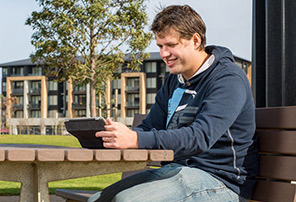You're viewing degree information for Australian students
You're an Australian student if you are any of the following:
- Australian or New Zealand citizen
- Australian Permanent Resident (including Permanent Humanitarian Visa holders)
Please remember your residency (the country you are currently in) has no impact on whether you are an Australian or International student.
Bachelor of Business (Economics, Finance and Trade)
Degree Level Undergraduate
Year 2025
-
View full entry requirements Hide full entry requirements
Entry requirements
Admission criteria
The admission criteria have been grouped to assist you to easily find the information most relevant to your circumstances. However, you may fit into more than one and the university will consider applicants against each of the relevant criteria.
Certain conditions apply. For more information refer to Appendix 4 of the University's Selection and Entry policy.
Applicants are required to meet one of the following criteria with a competitive result:
Higher education study
- Successfully completed equivalent to a minimum of half a year of full-time study of a higher education
program at a recognised higher education provider
OR
Vocational Education and Training (VET)
- Completed an award from a registered training organisation at Certificate IV level or above
OR
Work and life experience (for domestic students only)
- Passed a UniSA Online literacy and numeracy test and have relevant work experience;
- Completed a UniSA Foundation Studies program or equivalent; or
Qualified for Special Entry
OR
Recent secondary education
- Completed a secondary education qualification equivalent to SACE, such as an interstate year 12
international qualification with a competitive selection rank (ATAR)
Essential requirements for admission
Prerequisites
NoneAssumed Knowledge
None - Successfully completed equivalent to a minimum of half a year of full-time study of a higher education
Degree overview
- Build a fundamental understanding of economics, and graduate with an in-depth understanding of the global business environment.
- Learn about international markets, foreign exchange, and the financial systems of the world’s major economies.
- Explore the historical, cultural, social and political factors affecting international trade and investment.
- Discover how to apply logical, data-driven solutions to key business problems.
- Gain practical experience during your studies through a virtual internship opportunity.
- UniSA Business is accredited by both AACSB International (The Association to Advance Collegiate Schools of Business) and EFMD (EQUIS) – the world’s leading accreditation bodies recognising excellence in business education and research at a global level.
Snapshot

Study On Demand – this is a 100% online business degree designed specifically for online learning. With UniSA Online, you can take full control over your study, access support seven days a week, plan your study to fit around your life, view learning resources 24/7, and log into the interactive online environment anywhere, any time and on any device.
Economics is the study of decision making. It’s the backbone to everything, from individual decisions to business strategy to public policy making. With the global economy constantly shifting, an understanding of economics and finance is a solid foundation for a variety of career paths.
In this degree, you’ll learn about complex and multi-faceted economic and financial environments, exploring a range of topics from interest rates and inflation to economic growth and development. You’ll build your understanding of how and why people, businesses and governments make decisions, and learn to critically analyse and interpret information and provide sound business advice.
What you'll learn

Your studies begin with core courses in economic theory, accounting, statistics and business intelligence, giving you a broad understanding of the business environment. You’ll then move into your specialisation, and learn about a broad range of areas including supply and demand, trade theory and tariffs, and financial evaluation. You’ll analyse economic exchange and trade activities both nationally and within the international context, and delve into public policy challenges and how to address them.
You’ll have the opportunity to apply your knowledge during a virtual internship, where you’ll work on a real-world problem.
Most importantly, you’ll gain the skills to think critically and analyse complex data, and apply your knowledge to a range of economic, financial and societal issues.
Why Bachelor of Business (Economics, Finance and Trade)

With the global economy constantly changing, costs of living on the rise, and the effects of international health crises and technological disruption being felt in almost every industry, it’s never been more important to understand how decisions are made and their impact on society.
If you’re naturally curious about how the world works, or interested in wealth, poverty and equality, a career in economics and finance could be a perfect fit.
The Bachelor of Business (Economics, Finance and Trade) delivers the knowledge required to interpret the factors driving global economies, trades and exchanges, and financial markets, and their effects on decision making and investment.
As a UniSA Business student, you'll be eligible to join the Business Career Mentor Program (BCMP), an initiative designed to provide students and recent graduates with networking opportunities and career mentorship. You'll be paired with an experienced industry mentor to support your career development and transition after graduation, and be invited to professional development workshops and networking events.
Your degree has been designed and developed by expert academics whose research and professional experience shapes the courses they teach. You’ll also benefit from UniSA’s strong connections to industry, ensuring that what you learn during your studies is practical and relevant.
Your career
Broad knowledge of economics, finance and trade is a great foundation for whatever you want to do next. Your skills will be in demand in almost any industry, including banking and investment, government, and professional services. Your career and income opportunities are endless.
Careers to consider:
- Economist: use data and modelling techniques to provide specialist advice to consumers, organisations or governments on economic, business and policy-related issues; analyse and interpret data to forecast consumer business trends; apply economic insights to inform business decision-making.
- Business advisor: provide specialised advice and analysis on an organisation’s operations; prepare budgets, cost-benefit and risk analyses; review assets and resources, make recommendations for improvements.
- Business development manager: identify new customers, markets and industries for organisational growth; develop strategic plans, business cases, and contracts; build and manage relationships with clients.
- Market research analyst: collect and monitor product, consumer and competitor information; analyse data to inform recommendations and predict trends; design research methodologies and questionnaires; conduct surveys and focus groups.
- Policy adviser: conduct research into economic and societal issues to inform policy development; provide advice about existing policies and explore opportunities for improvement; build and maintain stakeholder relationships; collect and analyse data.
- Financial risk analyst: provide advice on investment decisions and strategies; identify and assess potential financial risks at the organisational and industry sector level.
- Trade and investment adviser: provide technical assistance to trade and investment institutions to increase their local and foreign investments, imports and exports.
Thinking of studying soon?
Your study experience and support
Study On Demand
Our online career-focused degrees give you full control and ultimate flexibility over your study. It’s Study On Demand, on your schedule, on your terms.
- Study 100% online - no need to come onto campus
- Choose from four start dates in January, April, June and September
- Learn in 10-week blocks
- Get support seven days a week - including on weeknights
- Access learning resources 24/7
- View course content before your term starts
- Work while you study
- Plan your study schedule ahead of time
- Fast-track your studies and receive credit for past study and/or work experience.
IT Requirements
As a general rule of thumb, any desktop or laptop computer purchased in the past three years should be capable of meeting your online learning needs. While mobile devices such as tablets and smartphones will be able to access most of your online course content, there are likely to be elements of most courses where we recommend you use a desktop or laptop computer. Your computer should be able to:
- run a modern browser (Microsoft Edge, Firefox 24, Safari 5, or Chrome 32 or later versions)
- run Java
- run programs to create documents, spreadsheets and presentations
- use a web camera and headset (or ear pods with microphone)
- Some UniSA Online degrees require an online exam. The online exam software – Remote Proctor Now – has specific capability requirements. Please refer to the system requirements prior to conducting your exam to ensure your computer is compatible.
Access free IT software and resources
As a UniSA Online student, you'll:
- Get free access to the full Office 365 ProPlus suite, which includes full versions of Word, PowerPoint, Excel, Outlook, OneNote, Publisher, Access and Lync software. Install the full suite on up to five different devices (PC and Mac compatible).
- Get 1Tb of personal storage that syncs with your PC or mobile device through OneDrive - it's like an extra hard drive that allows you to open any of your files from any of your devices, whenever you need them.
- Get free access to LinkedIn Learning - Access more than 5000 video courses on a broad range of topics such as: the Microsoft Office suite, time management and study skills, health and wellbeing, communication and presentation skills, photography, film making and designing your own games or mobile apps.
- Be able to connect with others using Microsoft Teams, Yammer and the Outlook Web App.
There are some degrees that have specialised software requirements. We've made this software available to students to access for free - you'll be able to download and install any of the required programs on your own device anywhere and anytime. See if your degree requires specialised software.
Check your device
Our computer system test will determine if your device has the base system resources and software required to study online. It'll also check the speed of your internet connection.
See if your computer, laptop or device is all set up and ready to go – it takes just a few seconds.
The application process is easy – just follow these simple steps:
-
Check your eligibility
Take our eligibility checker and answer a few short questions to see if you’re eligible. You’ll be given an option to continue your application, save it for later or request a call back from a Degree Adviser if you have any questions. -
Gather your relevant documents
If you're eligible, you'll receive an email outlining the entry requirements and the relevant documentation you need in order to be considered.
In order to verify your academic qualifications, you'll need to upload relevant documents like your official parchment, certificates or transcripts. If you have work experience, you will need to upload your CV as well as any other documents like work references, professional recognition or accreditation or your training certification.
Your email will contain information on the specific documents you need to provide as well as a link to log in to your application. You'll be asked to create an account and set your own password. -
Complete your application and send through your documents
In order to proceed with your conditional offer, you’ll need to complete your application and provide required evidence of your previous study or work experience.
Alternative Pathways
- complete the UniSA College Foundation Studies
- complete the UniSA College Diploma in Business
- complete the UniSA Online: UniStart
Online Course Facilitator
-
When should I apply?
UniSA Online degrees start four times a year in January, April, June and September. There are key application dates for each term. If you're looking to apply for credit, there are different closing dates you need to be aware of, so it's always best to double check. Key dates can be found at unisaonline.edu.au/key-dates.
-
Do I have to be online at set times?
All of our courses are asynchronous, meaning you choose when to study, whenever it suits you. However, if your degree has online exams, you will need to sit these at a designated date and time. Some courses may also require you to speak to your academics via phone or online communication channels at a mutually agreed time as part of your assessment.
-
What academic support is available?
Our academics are available seven days a week, including weeknights. Throughout your degree, you’ll be supported by our highly experienced academic team of Online Course Facilitators and casual academics. Our teaching team will guide you through your learning and ensure you have an outstanding, high-quality education.
They can help you with your course materials and assessments, provide feedback on your work, assist you with referencing, and can answer any other course-specific queries.
You’ll be able to contact your academics via email, online discussion forums and live messages in the online learning environment. You can also communicate in real-time and chat face-to-face with your academics online.
If you need after-hours learning support, Studiosity is a great resource that can help you with your writing, academic language, grammar and referencing. You’ll also be able to chat online with a Studiosity online adviser.
-
How is my degree structured?
Full-time students study two courses each term. It makes earning a degree completely achievable, especially if you’re working. Your degree is delivered over four terms each year. Each term runs for ten weeks with two-week breaks in between each term.
You’ll also have the option to go part-time, or switch between the two. If you need to take a break in your study, that’s an option too. We recommend speaking to your Student Adviser who can help you update your study plan and check when your courses are offered.
-
What career prospects do I have with my university qualification?
Our degrees are designed in conjunction with industry experts, employers and professional associations, and informed by the latest developments in your field. You will graduate with in demand skills and up-to-date knowledge required by industry.
You will be studying with a university known for its employment outcomes. Your UniSA degree is more than just a piece of paper – it will prepare you to start your career, or take it to the next level. UniSA's online students have graduate employment rates well above the national average.*
UniSA Online qualifications follow the same Government Higher Education Standards Framework as our on-campus degrees. The parchment you receive at the end of your degree will be the same as any other University of South Australia student.
*UniSA External UG full-time employment rate 83% Graduate Outcomes Survey 2018
-
What are the main differences between online, on-campus and distance education?
The knowledge you gain from each mode of study is the same – it's how you get there that's different. When you study online, everything from your course material to weekly activities and assessments are fully online. You'll communicate with academic staff and students via live messages, online discussion forums and email.
Studying on campus requires students to physically come on to campus at specific times to attend lectures, tutorials and practicals. On-campus students have face-to-face contact with academics and fellow students and also communicate via email and online discussion boards.
Distance Education involves physical course material packages being sent to students, usually print based but occasionally audio or video. Communication is usually via telephone, mail and email. In today’s digital era, distance education has been superseded by online education.
More FAQs








